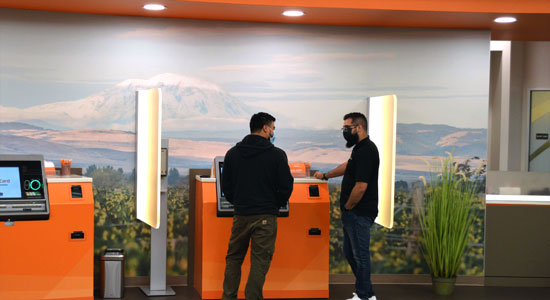
Deciding which financial institution to bank with is worth putting some thought into. Credit unions and banks are often compared because they are both potential options for banking, but that doesn’t mean they work exactly the same way. You’ll find that credit unions like Solarity Credit Union have a few similarities to banks that make them just as convenient while also having some differences that make them stand out among the crowd.
If you’ve been doing online searches for a “bank or credit union near me” and wondering what the differences are between the two, we have some information you might find useful.
Similarities
To start, credit unions and banks have a few things in common. Both can keep your money safe and provide the financial products and services you’ll need. Here are a few similarities between credit unions and banks.
Products
While it is sometimes said that banks offer more services than credit unions, that isn’t always the case. The products and services offered by both banks and credit unions are one of the biggest things they have in common, and credit unions can offer a wide variety of options to their members.
At both institutions, you’ll find options for home loans, auto loans and recreational vehicle loans, plus loan refinancing options. When it comes to standard banking needs, both credit unions and banks offer checking and savings accounts, ATM access and credit cards.
Online and mobile services
With technology advancing by the day, your finances are more in your control than they’ve ever been. This is thanks to so many convenient online and mobile banking services offered by banks and credit unions.
These digital services include online access to checking and savings accounts so you can check your balance, make payments and transfer money between accounts all from your cellphone or computer. Any device that can connect to the internet is able to access online or mobile banking, granting incredible convenience for banking on the go or from the comfort of home. People love having 24/7 access to their accounts from virtually anywhere, making this service a must-have for financial institutions, whether banks or credit unions. While banks may have been the first to provide digital services, credit unions quickly followed suit and now offer all the same convenient tools for managing your accounts online.
Your money is secure
You probably know that deposits at most banks are insured by the FDIC, so if the bank fails, you won’t lose all your money. But what about credit unions? Your deposits at a credit union are also federally insured but by the National Credit Union Administration (NCUA). Both the FDIC and NCUA provide a government-backed deposit insurance and protect each of your accounts to at least $250,000.
Differences
While there are many similarities between credit unions and banks, there are also a few notable differences. These mostly come down to the personal experience offered by credit unions and their community-minded business model. Banks often serve a large number of people across the country and have a business model that’s largely focused on making a profit. Their contrasting goals are typically what guide people to make a firm choice between the two.
Profits
One of the biggest differences between banks and credit unions is where their profits go. Banks are for-profit institutions and therefore are working to maximize their profits. They prioritize issuing dividends to their stockholders. This can lead banks to make decisions that are not always in the best interest of their customers.
Credit unions work in a different way, as they are not-for-profit institutions. This means that instead of working for investors, they make decisions based on what’s best for their members. The profits they make are returned to their members through things like better interest rates, lower fees and added conveniences for members.
Members vs. customers
You may have noticed that, when speaking about credit unions, we’ve referred to their customers as members. This is another key difference between banks and credit unions – banks have customers, credit unions have members. When you join a credit union, you become a member and part owner. This gives you a say in how credit union decisions are made. Bank customers have no ownership status or influence over how their financial institutions are run.
The idea of membership can lead to some confusion, however, since it isn’t always clear who is eligible to join a credit union. In many cases, the qualifications are as simple as living or working in a specific region. For example, you can join Solarity Credit Union if you live, work, worship or go to school anywhere in the state of Washington. You can also become a Solarity member if someone in your family already belongs or by joining the GoWest Foundation for a nominal donation.
Customer service and local decision-making
There are a variety of benefits available depending on who you bank with. One benefit of banking with a credit union is that your financial institution is based where you live and work. Credit unions are local entities so the people leading these organizations are also from your community. They are familiar with and understand the needs of the area, so they can make decisions that benefit their members. With this local focus, credit unions can provide you with more personalized customer service than a bank, which may be based anywhere in the country with no comprehension of your region’s unique banking needs.
Another benefit that you receive only when banking with a credit union is the opportunity to have a say in how your financial institution works. At a bank, higher-ups and stockholders make the policies and decisions. Credit unions, on the other hand, invite their members to get involved by attending annual meetings and voting to elect a board of directors that represents their interests. This allows for more personalized banking policies and benefits for the people using that credit union.
Fees
Most financial institutions charge fees for certain situations or services, such as processing loans or managing savings or checking accounts. As a general rule, bank fees are known to be higher than what you’ll find at a credit union. This is largely because banks need to make money for investors, and larger fees can create a pathway to larger profits. Credit unions tend to charge smaller fees and fewer of them, compared to banks. For instance, Solarity Credit Union offers both free checking and savings accounts.
Which should I bank with?
Deciding to bank with either a credit union or a bank is much easier when you know more about their differences and similarities. If you want to bank with a financial institution that is local to your area, community-minded and not-for-profit, then you’ll feel better about choosing a credit union like Solarity Credit Union in Washington State. Just search “credit union near me” to find one in your area.
With the best interest of members at the forefront of their decision-making, products and policies, credit unions are able to give their members a more personalized and positive banking experience. All of your banking needs can be met with the added bonus of great, local service when you bank with a credit union.
What's your Solarity story?
We're on a mission to tell the stories of our members and how they are living their best lives. Do you have a Solarity story to share?



